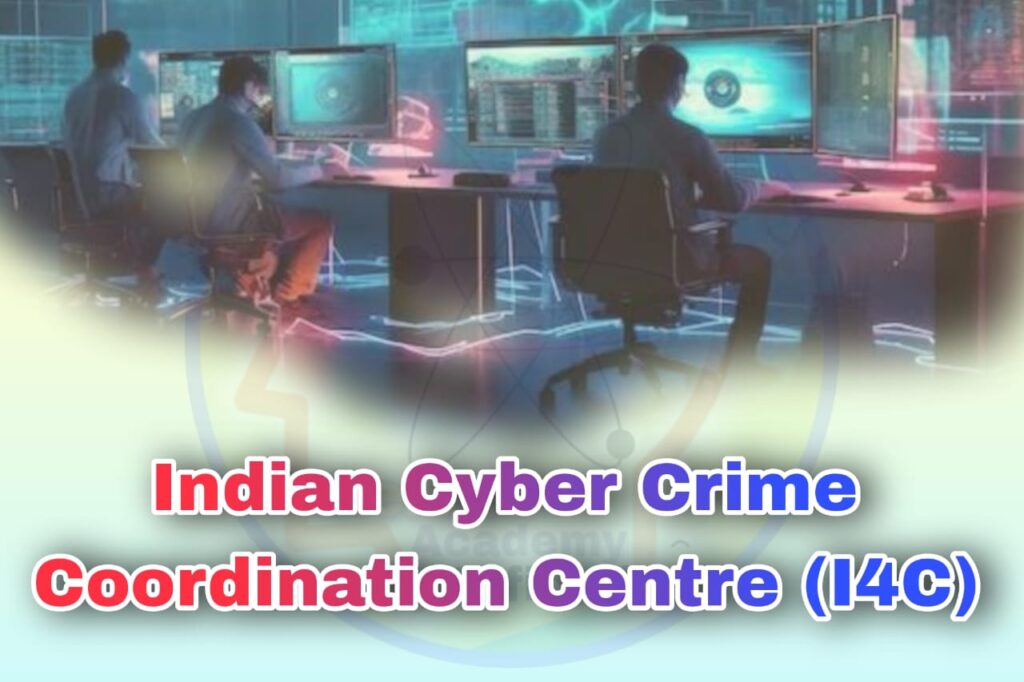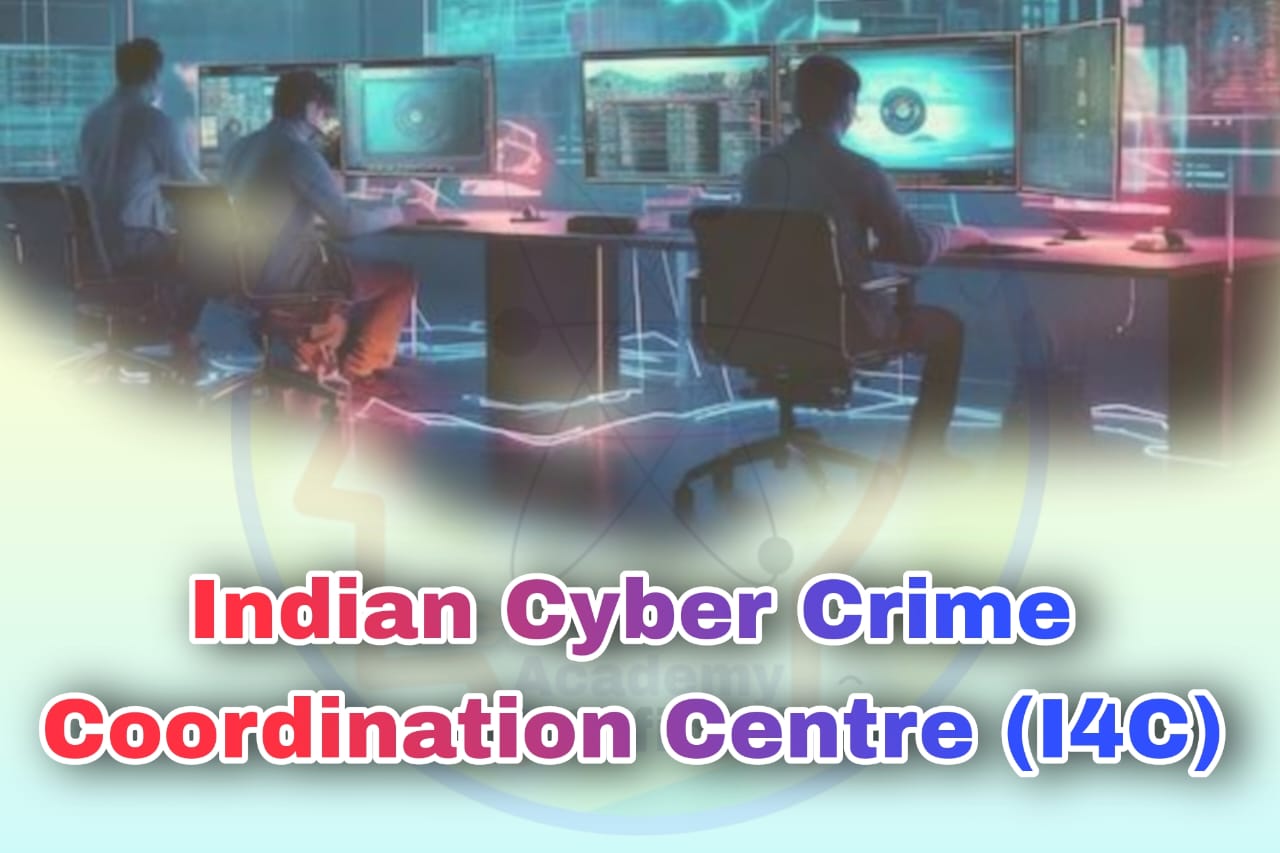
I4C : Indian Cyber Crime Coordination Centre
As cyber threats become more sophisticated and frequent, India’s response has been to create robust frameworks and coordination strategies to address these challenges. One of the primary institutions spearheading these efforts is the Indian Cyber Crime Coordination Centre (I4C), a specialized initiative under the Ministry of Home Affairs (MHA).
The Indian Cyber Crime Coordination Centre (I4C) was established as a nodal agency to tackle cybercrime with a comprehensive approach. It plays a crucial role in coordinating efforts across different law enforcement agencies (LEAs) and stakeholders in India. Recently, I4C raised an alert regarding illegal payment gateways used by transnational cybercriminals for money laundering, highlighting the pressing need for vigilant cybersecurity measures.
Location: The I4C headquarters is situated in New Delhi.
Key Functions of I4C
The I4C has a broad mandate focused on cybercrime prevention, research, policy support, and international collaboration:
- Central Coordination Point:— I4C serves as the central hub in the fight against cybercrime, streamlining communication between various LEAs.
- Research and Development (R&D):— I4C identifies key research needs and collaborates with national and international academic institutions and research organizations to develop forensic tools and cybersecurity technologies.
- Cybercrime Law Amendments:— The center monitors technological advancements and suggests necessary amendments to cyber laws to keep them current.
- International Cooperation:— I4C plays a role in managing Mutual Legal Assistance Treaties (MLAT) related to cybercrime, facilitating cooperation with other nations on cyber issues.
- Prevention of Extremism and Terrorism:— Another critical function of I4C is monitoring and preventing the misuse of cyberspace by extremist or terrorist groups.
Components of I4C
The I4C encompasses several specialized units designed to address various aspects of cybercrime management and prevention:
1. National Cybercrime Threat Analytics Unit (TAU)
The TAU regularly assesses emerging cyber threats and trends. By monitoring and analyzing cybercrime patterns, TAU aids LEAs in staying proactive against potential threats.
2. National Cybercrime Reporting Portal (NCRP)
The NCRP serves as a 24/7 nationwide platform for citizens to report cybercrime complaints, offering an accessible way to report incidents from “anywhere, anytime.”
3. National Cybercrime Training Centre (NCTC)
The NCTC provides targeted training for state law enforcement officials and other government personnel, building capacity at multiple levels to effectively respond to cyber incidents.
4. National Cybercrime Research and Innovation Centre
This center focuses on innovative solutions and indigenous technology development for preventing and managing cybercrimes in India.
5. Joint Cyber Crime Coordination Platform
I4C’s coordination platform facilitates data-sharing and the exchange of knowledge among LEAs across states and Union Territories, enabling a unified approach to combating cybercrimes.
6. Cybercrime Ecosystem Management Unit
This unit emphasizes cyber hygiene awareness and educates the public on best practices for online safety, aiming to reduce cyber vulnerabilities among the general population.
7. National Cybercrime Forensic Laboratory
Supporting LEAs in cyber forensic investigations, this laboratory provides essential resources for identifying, investigating, and prosecuting cybercrimes.
Collaborative Framework: Engaging Multiple Stakeholders
The I4C fosters collaboration across academia, industry, the public, and the government, ensuring a well-rounded response to cyber threats. Additionally, the Cyber Crime Volunteers Program invites citizens to contribute to the nation’s cybersecurity efforts by volunteering their skills and knowledge.
Additional Initiatives by I4C
Citizen Financial Cyber Fraud Reporting and Management System
This system allows for immediate reporting of financial cyber fraud cases, enabling authorities to quickly address incidents and prevent criminals from siphoning funds in real time.
National Toll-Free Helpline: 1930
A dedicated helpline number (1930) assists citizens with lodging cybercrime complaints, providing an accessible route for individuals seeking immediate support.
CyberDost Social Media Campaign
Through the CyberDost handle on social media platforms, I4C actively raises awareness about cyber safety practices, promoting digital literacy and vigilance among citizens.
Conclusion
The Indian Cyber Crime Coordination Centre (I4C) represents a pioneering approach in India’s fight against cybercrime. By integrating research, policy reform, training, and public engagement, I4C addresses cybercrime from multiple fronts, ensuring India’s digital landscape remains secure and resilient. Through initiatives like the National Cybercrime Reporting Portal, cybercrime training centers, and the Cyber Crime Volunteers Program, I4C exemplifies a proactive and inclusive model that encourages a secure digital environment for citizens and authorities alike.


